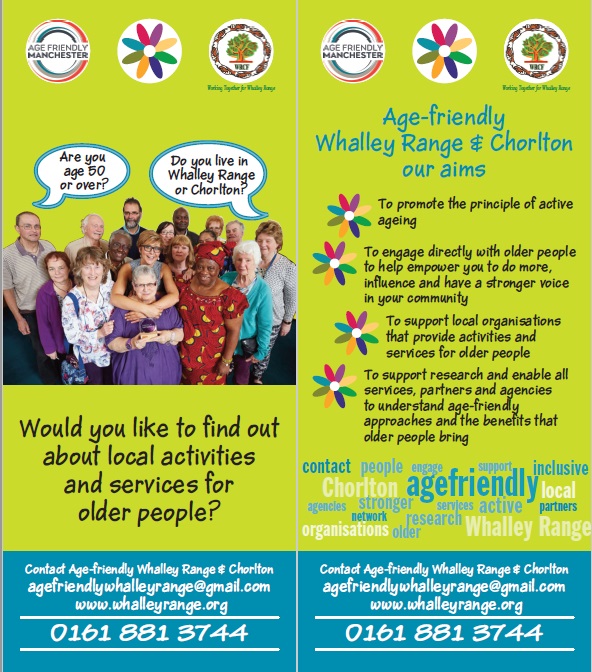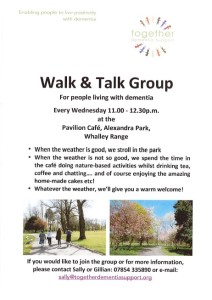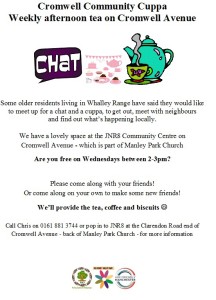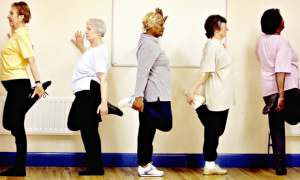Our WALK & TALK GROUP has just started and we had a lovely stroll in the sunshine on Wednesday, followed by tea and cake under the verandah of the pavilion. So, come rain or shine, we will be in the Russell Street entrance/car park of Alexandra Park at 10.45am, ready to walk at 11. We will stroll for approximately 50 minutes and then have refreshments in the pavilion, before leaving at 12.30pm. Gillian will lead the walk, assisted by our volunteers. The walk is open to people living with dementia and relatives/carers. You can just turn up but, if you phone first, then we can look out for you. Walking is widely recognised to be of great benefit to all of us but particularly to people with dementia as it boosts circulation, relieves stress and lifts your mood. It can also help you to sleep better. With friendly people to chat to and different aspects of nature to observe, it should give you an improved sense of fitness and wellbeing. And if you need to build up your stamina, dont worry, as there are plenty of benches to rest on!
Category: Age-Friendly Whalley Range & Chorlton
Annual Report for Age-friendly Whalley Range & Chorlton
We updated our Age-friendly Whalley Range and Chorlton Constitution in July 2022.
See the revised version here: Updated AFWR Ch Constitution June 2022 (2) https://www.whalleyrange.org/wp-content/uploads/2022/03/Updated-AFWR-Ch-Constitution-June-2022-2.pdf
Age friendly Whalley Range and Chorlton Constitution April 2016


Cromwell Community Cuppa: Afternoon Tea at JNR8 for older residents
Our first meeting last week was really good: 5 of us met up for a cuppa and a chat and a good laugh!
We looked at how we can get in touch with more older neighbours and shared thoughts about day trips and activities.
It was also really interesting to hear facts about the area from some of the residents who were born here over 70 years ago!
The local Co-operative pharmacy have been in touch to offer the Age-friendly Whalley Range group £200!
The Pharmacist will be attending our next Fitness and Fun exercise class for older residents to offer free blood pressure checks.
They are also going bringing along a photographer to promote our group and to take photos of us being presented with the cheque for the £200 – which will help us to put on activities and go towards planning our trips.
Please join us on Wednesdays from 2-3pm!
Issue 4 of the Age-friendly Whalley Range Newsletter is here!
Please click on the link below to read the latest issue featuring news and events for older residents living in Whalley Range and beyond…
AFWRNewsletter4_2015Final (updated version)
Third issue of our Age-friendly Newsletter
Here is the link to our latest newsletter promoting local age-friendly news, events and opportunities.
Let us know what you’d like to see in future issues – and keep a look out for our special Age-friendly Winter Health Newsletter
More men face lonely old age, says study
Increasing numbers of men are facing loneliness and isolation in old age, suggests research.
Men are often reluctant to join clubs for older people, says the study by the International Longevity Centre (ILC-UK) and the charity, Independent Age.
It predicts the number of older men living alone in England will increase by 65% by 2030.
“When their partner dies, often a man’s social life shrinks,” said Independent Age chief executive Janet Morrison.
The report: The Emerging Crisis for Older Men, says older women will still be more likely to outlive their husbands but, by 2030, growing numbers of men will outlive their wives.
The analysis of recent data from the English Longitudinal Study on Ageing suggests 1.5 million older men will be living alone by 2030 – up from 911,000 today.
‘No visitors’
Older men often also have less contact with family and friends than women of a similar age, meaning they are often more socially isolated once their spouse dies, says the study.
“The house was always full of kids,” 73-year-old John, whose wife died five years ago, told researchers.
“Women keep the family together and people rally around them.
“When women die, people drift away from the man left behind.”
Evidence suggests men and women experience social isolation in different ways, says the report, with men less likely to ask for support.
Widower Dick O’Brien, 77, from Reading, told BBC News he has 13 grandchildren and 10 great-grandchildren but they are “busy with their own lives” and he sometimes has no visitors for days.
He has tried going to clubs but says: “For some unknown reason I just don’t fit in. It makes me feel older than I am.
“I socialise best when I am on my scooter, when I’m having a chat to anyone on the road.
“When I’m out people think, ‘He’s a happy old soul.’
“I am, but you are coming back to an empty house.
“It’s very, very lonely. And you think why do I bother? You know it’s worth bothering. Of course it’s worth bothering but it’s depressing. It’s very depressing. It gets to you.”
A short guide to social media from Friends of the Elderly
Why use social media?
Social media is a fantastic way to stay connected; to friends and family, to people and organisations – and to the wider social media community. Currently, over 900 million people use Facebook, and over 500 million people use Twitter, and that growing!
So why not get involved? Read this fantastic guide here:
2012_72-FOTE-Social-Media-Leaflet-A5-8-page2-1
Age-friendly Whalley Range Newsletters
Welcome to our newsletter links!
Since the first issue of our newsletter was circulated door to door across the Whalley Range ward, we have held lots of events and made lots of new friends and contacts.
Issue 1: AFWRNewsletter2014_Draft
Read issue 2 here: AFWR_Newsletter_2
And here’s issue 3! AFWRNewsletter3_2014_Final
Technology: The fastest growing group of tablet users are over-60s
Older people are biggest tablet fans
The screen is sharper than iPad’s for reading
“The fastest growing group of tablet users are over-60s,â€
Clare Newsome says. “Skype lets them stay in touch with loved ones – and learning new things helps keep brains activeâ€.

New machines such as Samsung’s Tab S (pictured) are great for older users as the screen is sharper than the iPad’s, and great for reading too.
Ali Crossley, Executive Director of retirement home chain McCarthy & Stone said: There is a perception that retirees are less in touch with technology, but that isnt the case anymore.â€
Half of pensioners used Facebook and two-thirds said their children had helped them choose a tablet for staying in touch.
Up to 80% of older people say they want a smartphone
Older users even have their own smartphones.
The Doro 740 has large keys and a remote-access function so children can help if it goes wrong. Its makers described it as a “phenomenal” hit when it launched.
Maker Doro said demand for the product was high because 80% of older people said they wanted a smartphone to stay in touch with family.
https://uk.news.yahoo.com/how-the-family-stays-connected-with-apps-and-gadgets-072031713.html
Calling on the Government to protect older people human rights
Yesterday morning, Age UK handed its petition into the Department of Health, calling on the Government to close a loophole that means some older people receiving care are not directly covered by the Human Rights Act because of the way their care is arranged and paid for.
It an absurd situation. Two people living in the same care home could have different rights and protections because of this loophole. That means that when abuse and neglect takes place, some people have fewer options for redress. We think this is wrong.
Since we launched our petition in January, thousands of people have agreed with us. Over 17,000 people added their voice to our campaign – a phenomenal response – and we have now passed this on to the Care Minister.
On Monday, MPs will be debating the Care Bill in its Report Stage. In its previous stage, a committee of MPs narrowly voted to remove Clause 48 from the Care Bill. Clause 48 was introduced to the Care Bill in the House of Lords to close the loophole in protection. This was disappointing but not unexpected. In that debate, MPs were referring to public support for Clause 48 and we know that our petition helped to push the vote so close.
Now a new clause is to be debated in the House of Commons on Monday. This clause, recommended by the Joint Committee on Human Rights, a group of cross-party MPs and Lords, would close the loophole for the vast majority of older people who need care services.
Thanks to so many people signing our petition and contacting their MPs, we now have a great opportunity to keep the pressure on MPs to accept this new clause and provide clarity on the type of protection people receiving care services should have.
If you are interested in the background to this, take a look at our briefing for MPs on better protection for people receiving care services.
Ageing population: what can the UK learn from overseas?
Our rapidly ageing population raises a slew of questions for our society. How will we meet the cost of social care? What can we do to prevent isolation and loneliness? How can we promote the positive contribution that older people make to society?
Many developed nations are facing the same challenges. “Were all wrestling with the problems of social isolation and loneliness in one way or another,†said Mervyn Kohler, external affairs advisor to Age UK.
He added: “You cant assume that we can pick up a model from one country and transplant it over here, but … there are many more imaginative ways to address the growing problem.â€
Here are five projects making an impact in managing an ageing population.
Germany
Alongside regular taxes, German citizens pay into a social insurance scheme which pays for the cost of care that may be needed in later life or if long term illness or disability hits. When citizens make a claim they have a choice: either they can take a lump sum or they can ask for “payment in kindâ€, which means the cost of the services they need will be covered by the state.
“The cash payment is of much lower value than if youd opted for the services in kind, but it very popular,†said Caroline Glendinning, professor of social policy at the University of York. “It used to support family care giving.â€
The scheme is financially stable because, culturally, care is often provided informally by family members, and so the strain of paying for large amounts of care does not fall to the state. Opting for the single payment also means the carer has some claim to the money. The scheme pays into the pension of the carer, offers four weeks respite care and provides access to training.
“The German social insurance idea is a good one in terms of trying to ensure that the entire population actually has an income which is respectable and adequate enough to open up the possibility of social inclusion rather than just mere survival,†said Kohler.
Netherlands
In the Netherlands, a visiting scheme for older people has been established to prevent isolation. Volunteers are recruited en masse. They provide older people with information about services, ask about their emotional wellbeing and establish if they are lonely. If the volunteers cannot solve a problem themselves they turn to professionals. The aim of the scheme is that every older person in the country is visited at least once a year, but the performance of local governments varies depending on their financial situation.
France
French authorities have developed an inter-generational leisure scheme which helps pensioners to spend their holidays with family, even if they are frail. Funds from the French state pension are diverted to fund the construction of large holiday complexes suitable for all the family, from small children to the very old – with most located in already popular holiday destinations along the southern and northern coastlines.
“It an excellent example of lived inter-generational solidarity: you can actually go on holidays as a family, including grandparents, if some basic healthcare and social care infrastructure is provided,†observed Andreas Hoff, a research fellow at the Oxford Institute of Ageing.
He added: “Isnt that much better than asking for respite care? Middle-aged caregivers get respite without the feelings of guilt for leaving behind their parents in institutional care.â€
The holiday parks have easy access for disabled people and sheltered accommodation with specialist medical and care facilities. Holidaymakers do pay for their stay, but some families can apply for assistance.
Japan
Adachi, a heavily populated ward in the north of Tokyo, has launched a “zero isolation†project aimed at reaching out to its ageing community. Data is analysed on all people over the age of 70. Older people who talk with someone outside their household less than once a week, or has nobody to turn to for help are defined as isolated. For those who meet the criteria, visitors help to break the cycle of isolation and encourage participation in events such as karaoke, exercise groups and shared dinners. There are events aimed at bringing isolated people out of their homes and into the community at least twice a month.
“Adachi initiative around zero isolation was a specific response to the community despair that a deceased older man could lay undiscovered in his home for as long as 30 years,†said Andrew Stevens, chief researcher at the Japan Local Government Centre.
He added: “The scheme was aimed at using existing resources and structures more effectively to promote vigilance on the part of a busy population living in a Tokyo commuter suburb, towards their older neighbours.â€
The scheme is already being rolled out to single parents.
Cyprus
Cyprus has established a parliament for older people made up of representatives from charities and groups. It meets once a year, together with the Cypriot president, the minister of health and the minister of labour and social insurances. Ministers are bound by law to implement some of their decisions. The parliament even delayed a recent banking vote, to protect the interests of savers.
Ireland has a similar scheme, the Irish senior citizens parliament, which is run by volunteers and has had huge success in rallying older people to put pressure on government.
Our ageing population: what role will you play?
There no escaping the fact that were getting older. There are ten million people in the UK who are over 65, and by 2050 this is predicted to have risen to 19 million, according to the government. In the UK and in developed countries around the world, an ageing population is the new reality. It a reality that poses challenges to society, but also unique opportunties for students and graduates.
There an image problem surrounding working with older people; it not something students necessarily think of as a career path. But if youre looking for a rewarding career in a growing field, it worth taking an interest in our ageing population.
“Ageing is integral to everything in society,†says Dr Paul Nash, postgraduate programme director in ageing studies at Swansea University. “If you want to make an impact in society you can make it directly through working with older adults, or indirectly through changing policy or challenging stereotypes. Also innovatively, by designing products that older people actually want and that address the needs of an older consumer base.â€
A number of postgraduate courses in gerontology, or ageing studies, teach students about the social and politicial implications of an ageing population, as well as providing modules in working directly with older people.
Healthcare and social work probably has the most obvious link to working with older people and having an impact on their lives. But specialising in geriatric medicine might not have been what you imagined when you first pictured becoming a doctor or nurse.
Dr Terry Quinn, lecturer in geriatric medicine at the University of Glasgow says: “There been a PR issue in the past. Geriatric care and the care of older adults hasnt been seen as exciting or sexy. It not cardiology or intensive care or the things that you see on TV that get people initially excited about healthcare.
“But actually it very rewarding and is the reality of contemporary healthcare. Most people receiving healthcare now are older adults.â€
As our population ages, there also an increase in demand for graduates who have the skills to deal with illnesses that particularly affect older adults, such as dementia.
Ian McMillan, head of division of occupational therapy and arts therapies at Queen Margaret Universitys, says: “As dementia becomes more prevalent in society it is critical that we ensure our healthcare graduates better understand the specific needs of people with dementia, their carers and their families.â€
Informing yourself about the specific needs of older adults, either by choosing modules on an undergraduate course or specialising in geriatric care at postgraduate level, will prepare you for the reality of a career in healthcare. But it can also be a particularly rewarding career path that you might not have considered.
“If you are a cardiologist you focus on one thing, but as a geriatric specialist you are potentially looking at a whole range of processes,†says Quinn. “That variety makes for an intellectuatlly stimulating and interesting job.â€
Dr Jenni Harrison is in her fourth year of postgraduate medical training at the University of Leciester, specialising in the care of older people. She says: “Geriatric medicine is not neccessarily something that grabs people as a thought of something they might like to do. But it a potentially very rewarding career in medicine.
“I enjoy speaking with a patient family and the holistic approach: making sure the patient has enough help at home and that their wider problems are looked at. It makes you feel like youve set something up that will help things in the future.â€
There plenty of demand for geriatric specialists, says Harrison, and it can prove a flexible career path, with the opportunity for community, hospital and medical research work.
A degree in social care could also lead you towards specialising in the care of older adults. Dominique Brady is currently studying for a master in social work at Middlesex University, and says: “Sometimes people think working with older adults is just about basic needs and personal care, and that it less creative, less flexible, less challenging and rewarding than working with younger people.
“But I really dont think that true. Working with older adults can be incredibly challenging but also incredibly satisfying.â€
Brady hopes to work in either a hospital team or local authority after graduating. “I really value the life experience that older people have – you can get a lot of insight from working with older people. I think it also a group that is very marginalised in our society, their voices can often be lost. You need people to work with and advocate for older people because they are a group that has a low status in society but is also very valuable.â€
There are many charities dedicated to issues affecting older people, and the right degree can lead you towards meaningful work in this area. Marcus Green did a PhD in social statistics and gerontology, and now works for Age UK, managing the social and economic research team.
He says: “We do research that might inform our policy, positions and statements on particular issues that affect older people such as the provision of social care and the social care system. We need to do more to support older people to for example work longer, but with the correct support to do that. Were in need of good brains and innovators.â€
So what kind of degree might be relevant to study if youre interested in doing this kind of research?
Green says: “Any degree in the social sciences would be very applicable to this kind of area. If youve got a background in politics too then you know a bit more about the behaviour of government and the particular policies that affect older people.â€
There are other benefits to working in a growing field, says Green. “It also fairly rewarding in terms of salary because this is a growing area so there tends to be more investment and funding available.â€
A career in researching the issues faced by older people could see you directly impacting policy and therefore people lives. But there are also business implications of an older population, and savvy students could be picking up on the “grey market†as an exciting area for growth and innovation.
Athina Vlachantoni, a senior lecturer in gerontology at the University of Southampton, says: “Increasingly services and products that are developed will have to take the older person into account.
“Im in my 30s now but by the time Im in my 60s, one in three people around me will be an older woman aged over 70. You have to change the way you think about everything from coffee shops to restaurants to products.â€
Preparing for a career that takes into mind an ageing population requires an attitude change more than anything else. As an engineering or architecture student could you be thinking about buildings and services that take into account the needs of an older population? And if youre doing a fashion degree: what do older adults actually want to wear? Chances are it not always a cardigan and ankle-length skirt. Thinking differently about what you choose to study, and what you choose to do with it, could lead towards a career that has a real and exciting impact.
Taking an interest in our ageing population when picking your degree or while at university could make a difference in changing the way older people are perceived. Vlachantoni says: “By educating more people about the process of ageing and the issues faced by older people you are making the topic of older people much more prevalent in society.â€











